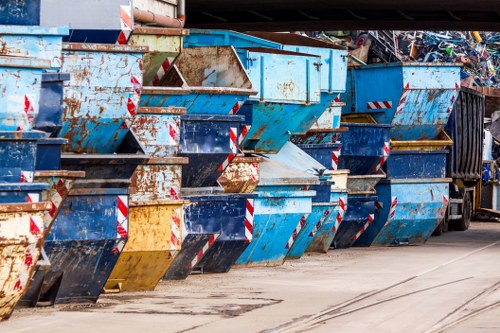Litter Clearance in Rubbish Sucks: Understanding the Challenges and Solutions
The Impact of Litter on Our Environment

Littering is not just an eyesore; it has profound effects on the environment, wildlife, and even human health. When waste is not disposed of properly, it can lead to pollution of our natural habitats, harming plants and animals alike.
Moreover, litter can clog waterways, leading to flooding and waterborne diseases. The accumulation of trash in natural settings disrupts ecosystems, making it difficult for flora and fauna to thrive.
Addressing litter clearance is thus essential for maintaining the balance of our ecosystems and ensuring a healthy environment for future generations.
Challenges in Effective Litter Clearance

One of the primary challenges in litter clearance is the sheer volume of waste generated daily. With urbanization on the rise, managing and disposing of waste has become increasingly difficult.
Additionally, public awareness plays a significant role. Many individuals are unaware of the consequences of their littering habits, leading to inconsistent disposal practices.
Furthermore, limited resources and inadequate infrastructure can hamper cleanup efforts, making it harder to maintain clean communities.
Innovative Solutions for Litter Management

To combat the issue of litter, various innovative solutions have been proposed and implemented. One effective method is the use of smart bins that notify waste management services when they are full, ensuring timely collection and reducing overflow.
Community-driven initiatives, such as neighborhood clean-up events, can also foster a sense of responsibility and encourage individuals to take part in maintaining their environment.
Moreover, integrating technology like drones and AI in litter detection can streamline the identification and removal of waste, making the process more efficient.
The Role of Legislation and Policies

Legislative measures are crucial in enforcing proper waste disposal and mitigating littering. Stricter fines and penalties for littering can deter individuals from improper disposal.
Implementing comprehensive recycling programs and incentivizing sustainable practices can also reduce the amount of waste generated, thereby easing the burden on litter clearance systems.
Additionally, policies that promote the use of biodegradable materials can minimize the long-term impact of waste on the environment.
Community Engagement and Education

Educating the public about the importance of proper waste management is essential in the fight against litter. Schools, community centers, and media campaigns can play a pivotal role in raising awareness.
Engaging the community through volunteer programs and providing easy access to waste disposal facilities can encourage more responsible behavior.
Ultimately, fostering a culture of environmental stewardship is key to ensuring lasting changes in litter management practices.
Technological Advancements in Litter Clearance
Smart Waste Management Systems
Advancements in technology have revolutionized waste management. Smart bins equipped with sensors can monitor waste levels in real-time, optimizing collection routes and reducing operational costs.
These systems not only enhance efficiency but also provide valuable data that can be used to improve waste management strategies.
Implementing such technologies can significantly improve the effectiveness of litter clearance efforts.
Economic Implications of Litter Clearance
Cost of Cleanup Operations
Effective litter clearance requires substantial financial investment. Municipalities must allocate funds for cleanup operations, equipment, and personnel.
However, the long-term economic benefits, such as increased tourism and reduced environmental degradation, often outweigh the initial costs.
Investing in efficient waste management systems can lead to sustainable economic growth.
Health Risks Associated with Litter
Spread of Diseases
Litter can become a breeding ground for harmful bacteria and pests, posing significant health risks to humans and animals.
Improperly disposed waste can contaminate water sources, leading to waterborne diseases and other health hazards.
Ensuring proper litter clearance is thus vital for public health and safety.
Call to Action: Join the Fight Against Litter Today
Take Responsibility
Every individual has a role to play in maintaining a clean environment. By taking responsibility for your waste and disposing of it properly, you contribute to the larger goal of effective litter clearance.
Encourage others to follow suit and participate in community clean-up events. Together, we can make a significant impact.
Contact us today to learn more about how you can get involved and help keep our surroundings clean and healthy.